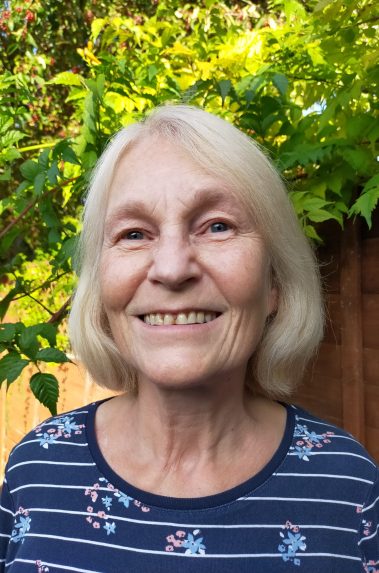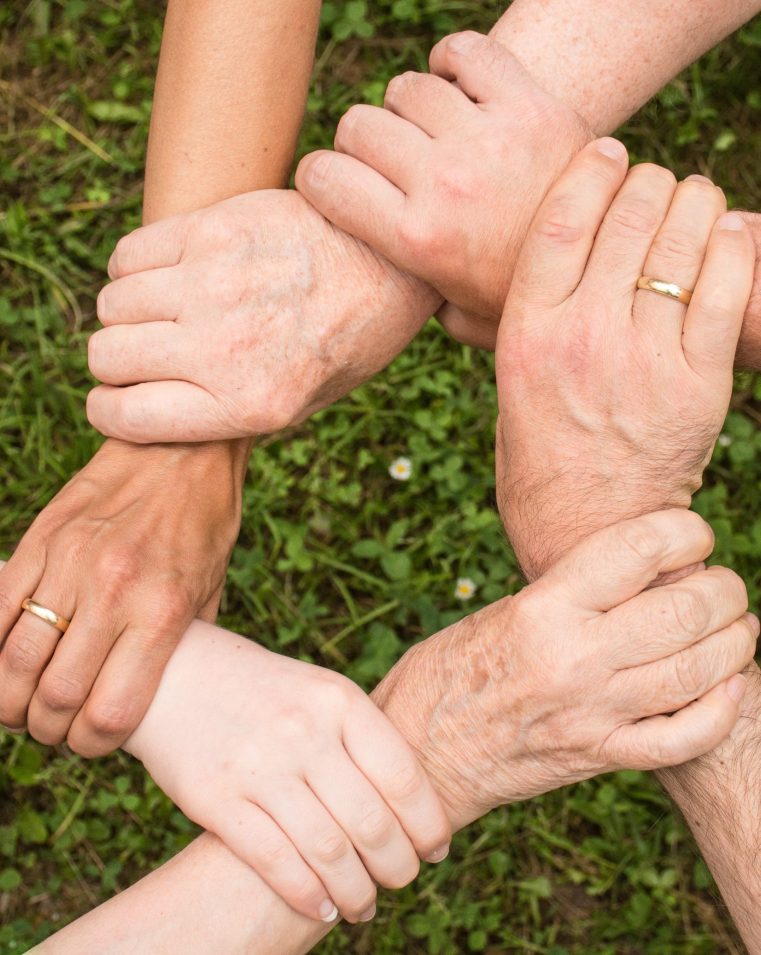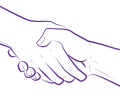Regain hope after a loss
I'm here to help after a bereavement or loss, and to support you as you care for others
Welcome
At times, life feels overwhelming. Loss can be all-consuming,. It can feel as if your world has come to an end. And I see it as a sign of strength, not weakness, to search for help when you’re feeling that way. You may not realise it, but you’re already taking the first step towards getting the peace of mind you crave.
Counselling can help with a diverse range of problems, and I specialise in:
- Bereavement and loss (see My specialisms for loss-related issues I can help with)
- Carers’ issues – an area close to my heart through family experience (see Caring for the carer)

Bereavement & loss
Bereavement and loss can leave you feeling as if you're on a rollercoaster of despair, guilt and anger, but you don't have to cope alone.
My clients have told me that sharing the good and the bad feelings and memories, the socially acceptable ones, and the 'do-I-dare-admit-to-this?' ones has been cathartic and healing. I promise never to judge you - you're a human being, and all of us at some time have difficult, conflicting feelings. Voicing these out loud to someone who'll empathise, and look at the reasons behind them, can be the first step to self-compassion, and a deeper understanding of yourself.
There are many other types of loss, which cause intense feelings similar to bereavement – and it’s important to acknowledge them, rather than let them eat away at you inside. For instance, many people derive their self-worth from the job they do – so redundancy or retirement can be a major shock, causing them to rethink their identity. Many need to grieve for what’s lost before they are ready to move on.


No more struggling alone
Maybe you are feeling sad, lost, or angry right now. As a person-centred counsellor, I will listen and aim to understand your world from your unique point of view. Together we can explore your feelings and dilemmas to help you move forward in a positive way. I offer a safe, confidential space and promise never to judge you.
Sometimes it can be hard to stop yourself going round and round your worries in your head and getting stuck in a loop. Being able to talk to someone outside your situation can break that loop and help you to see your situation from a different perspective. Being REALLY listened to and understood can free you to make the decisions you need to, or to come to terms with a new life situation that is out of your control.
Sessions are geared around the issues you bring, rather than me setting an agenda for the therapy.
FAQ
My current fee is £50 for an individual counselling or assessment session, payable 24 hours in advance, preferably by Bank Transfer.
The usual frequency is once a week.
50 minutes.
No. I believe that recognising when you need support is a sign of strength, not weakness. It’s a sign of being human that sometimes you need help along the way.
Many people try to carry on with normal life, however big their problems – but beyond a certain point, struggling alone can make matters worse. If you’re feeling down, or lost, or there’s no joy in your life, doesn’t it seem a waste to ‘just get on with it’ when you could get support to find peace of mind?
Confidentiality is of primary importance in the counselling relationship. Information about you will not be released to any other person without your prior consent, unless it relates to my legal and ethical responsibilities. Anything said during sessions and any notes taken will be treated as strictly confidential. In agreement with BACP (British Association for Counselling & Psychotherapy) ethical guidelines, I will only discuss the work done together with my clinical supervisor, who will also treat any information about you as confidential.
*Rare circumstances in which I may need to break our confidentiality
agreement include:
*1) If I believe you were at immediate risk of attempting suicide, self-harm or harm to others
2) If you reveal information relating to terrorism or are required by a court of law
3) If there are concerns about the safety of a child
Taking time out to care for your mental wellbeing has the potential to help not just you, but the person you care for too. Could a friend or family member take over your caring role for that hour or two a week? If possible, face-to-face counselling is beneficial, as you can be fully focused on it, and won’t be called away. However, I can also offer counselling online or on the phone. Let me know what works best for you.
(See Caring for the Carer)
‘I don’t want someone telling me what to do’
Rest assured: this is not what counselling is about. I’m not there to take over and make your decisions for you. The way I look at it, if I take the time to understand where you’re coming from, and then explore your options with you, you’re more likely to be confident about making a change in your life or taking an informed decision.
My aim is to help you to discover and trust in your own abilities and autonomy.


Caring for the carer
Working with unpaid carers is a passion of mine. My mother was my father’s carer from my childhood onwards, and this helped me understand the strains, tensions, joys but also potential long-term effects of a caring role. Since then, I have worked for several London carers centres, getting involved in counselling, support work and groupwork.
All too often, unpaid carers who are caring for a family member or friend can be under huge strain and can easily become isolated from their former life and social contacts. This is where counselling can help.
My carer clients have told me that it was a lifeline for them to be able to talk things through and let off steam with someone who was not directly involved but knew exactly where they were coming from.
Many carers may feel they’re too busy with the demands of their role to spend an hour or two out of the house attending counselling. And yet taking time out to care for your mental wellbeing has the potential to help not just you, but the person you care for too.
If you become burnt out and potentially resentful, nobody wins. Whereas if you have a chance to air those feelings, whether that’s exploring coping mechanisms or simply having an empathetic listener, you’re more likely to return home reinvigorated and better able to fulfil your caring role.
Could a friend or family member take over your caring role for that hour or two a week? If possible, I feel face-to-face counselling is beneficial, as you are away from home, and won’t be called away. However, I can also offer counselling online or on the phone – if there’s a good time of day and you have a private space to talk, let me know, and we can sort something out.
Evidence suggests that the relationship between client and therapist is a key factor in enabling therapeutic change
What to expect
I offer a free initial phone call of around 20 minutes to have a chat about what has brought you to counselling. This would be a chance for you to see how it feels to talk to me about yourself, and if you think I am the right counsellor for you.
It will also help me to work out if I am the right person to help you, or if I would need to refer you to someone else.
If both parties agree, I will then book you in for a 50-minute ‘mutual assessment’ session face to face, and we can talk more about your expectations and hopes, and any background information you feel is important for the counselling. We would also discuss the times and frequency of sessions, and the counselling terms. I will be happy to answer all your questions and address any concerns.
My specialisms
Counselling can help with a diverse range of problems, and my specialisms are:
⦁ Bereavement
⦁ Carers’ issues – an area close to my heart through family experience (See About Me and Caring for the Carer). Losses could include loss of identity; loss of the future you had imagined for yourself.
Other types of Loss, including:
⦁ Relationship difficulties or break-up
⦁ Redundancy
⦁ Issues from childhood that are impacting on the present
⦁ Long-term ill-health
⦁ Divorce or separation
⦁ Loss of self-worth
⦁ Children leaving home
⦁ Retirement
⦁ Loss of pregnancy
⦁ Fertility issues
⦁ Loss of trust
As a qualified counsellor, I am a member of the British Association of Counselling and Psychotherapy, and abide by their code of ethics.
About me
My interest in counselling goes back many years. Before training at Wimbledon Guild, and going into private practice in Epsom in 2021, I worked in journalism. One day I edited an article about a charity which was looking for volunteer counsellors – and my decision to apply was one of the best I ever made. I was introduced to a completely different environment and way of thinking – one I soon realised meant more to me than my actual job!
In 2012, I switched careers to work in the health, social care and charity sectors – and continued volunteering as a part-time counsellor in my spare time. This included working at Kingston Bereavement Service for three years, including during the Covid pandemic, and at Paul's Cancer Support Service in Battersea, London.
I also worked for several London carers centres, getting involved in counselling, support work and groupwork. Working with unpaid carers is a passion of mine, through personal family experience. (See Caring for the Carer). This has helped me understand the strains, tensions and potential long-term effects of a caring role. Clients have told me that it was a lifeline for them to be able to talk things through and let off steam with someone who was not directly involved, but knew exactly where they were coming from.
Counselling qualifications and training:
- Level 4 Diploma in Attachment-based Counselling
- Level 1, 2 and 3 qualifications in Person-centred Counselling.
- Continuing Professional Development (CPD) training in Bereavement Counselling, Online Counselling, Trauma Awareness.

Get in touch
Feel free to contact me if you have any questions about how counselling works, or to arrange an initial assessment appointment. This enables us to discuss the reasons you are thinking of coming to counselling, whether it could be helpful for you and whether I am the right person to help. You can also call me on 07498 984340 if you would prefer to leave a message or speak to me first.
LOCATION
I am based in Epsom, and offer face to face counselling from a private room in The White House Health and Wellness Centre, Epsom (in a convenient location, near to Epsom station). I am within easy reach of Ashtead, Ewell, Kingston, Sutton, Wimbledon and Richmond. I can also offer online and telephone counselling. Let me know what works best for you.
CODE OF ETHICS
As a qualified counsellor, I am a member of the British Association of Counselling and Psychotherapy and abide by their code of ethics'




